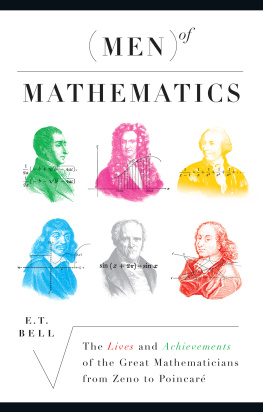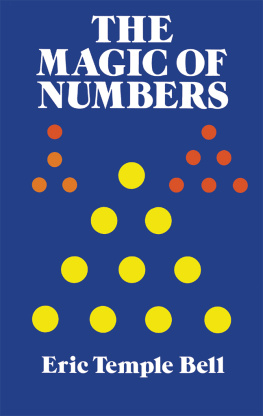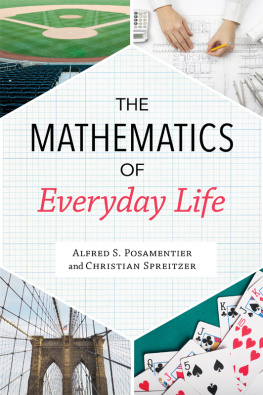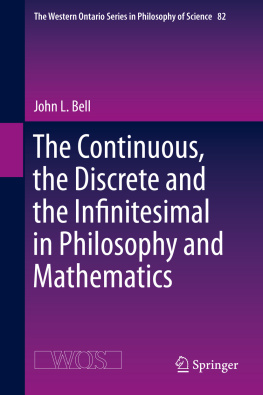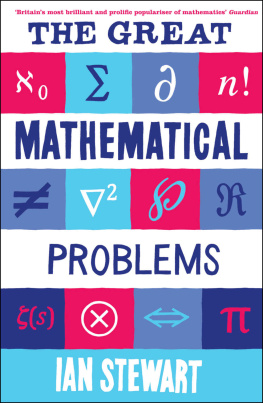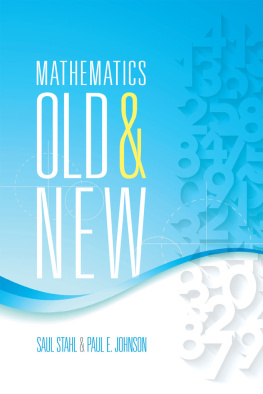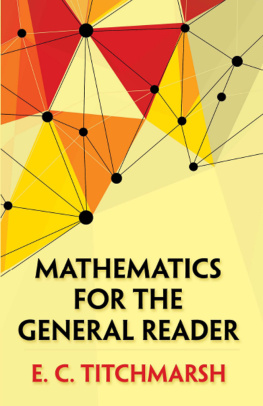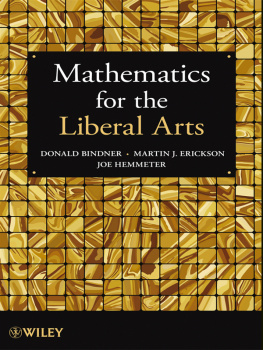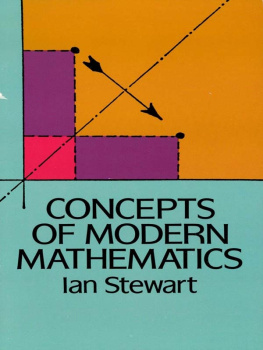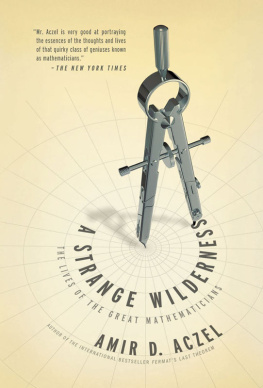Thank you for downloading this Touchstone eBook.
Join our mailing list and get updates on new releases, deals, bonus content and other great books from Touchstone and Simon & Schuster.
C LICK H ERE T O S IGN U P
or visit us online to sign up at
eBookNews.SimonandSchuster.com
Contents
For the readers comfort. The beginning of modern mathematics. Are mathematicians human? Witless parodies. Illimitable scope of mathematical evolution. Pioneers and scouts. A clue through the maze. Continuity and discreteness. Remarkable rarity of common sense. Vivid mathematics or vague mysticism? Four great ages of mathematics. Our own the Golden Age.
Z ENO (fifth century B.C .), EUDOXUS (408-355 B.C .), ARCHIMEDES (287?-212 B.C.)
Modern ancients and ancient moderns. Pythagoras, great mystic, greater mathematician. Proof or intuition? The taproot of modern analysis. A bumpkin upsets the philosophers. Zenos unresolved riddles. Platos needy young friend. Inexhaustible exhaustion. The useful conics. Archimedes, aristocrat, greatest scientist of antiquity. Legends of his life and personality. His discoveries and claim to modernity. A sturdy Roman. Defeat of Archimedes and triumph of Rome.
D ESCARTES (1596-1650)
The good old days. A child philosopher but no prig. Inestimable advantages of lying in bed. Invigorating doubts. Peace in war. Converted by a nightmare. Revelation of analytic geometry. More butchering. Circuses, professional jealousy, swashbuckling, accommodating lady friends. Distaste for hell-fire and respect for the Church. Saved by a brace of cardinals. A Pope brains himself. Twenty years a recluse. The Method. Betrayed by fame. Doting Elisabeth. What Descartes really thought of her. Conceited Christine. What she did to Descartes. Creative simplicity of his geometry.
F ERMAT (1601-1665)
Greatest mathematician of the seventeenth century. Fermats busy, practical life. Mathematics his hobby. His flick to the calculus. His profound physical principle. Analytic geometry again. Arithmetica and logistica. Fermats supremacy in arithmetic. An unsolved problem on primes. Why are some theorems important? An intelligence test. Infinite descent. Fermats unanswered challenge to posterity.
P ASCAL (1623-1662)
An infant prodigy buries his talent. At seventeen a great geometer. Pascals wonderful theorem. Vile health and religious inebriety. The first calculating Frankenstein. Pascals brilliance in physics. Holy sister Jacqueline, soul-saver. Wine and women? Get thee to a nunnery! Converted on a spree. Literature prostituted to bigotry. The Helen of Geometry. A celestial toothache. What the post-mortem revealed. A gambler makes mathematical history. Scope of the theory of probability. Pascal creates the theory with Fermat. Folly of betting against God or the Devil.
N EWTON (1642-1727)
Newtons estimate of himself. An uncertified youthful genius. Chaos of his times. On the shoulders of giants. His one attachment. Cambridge days. Young Newton masters futility of suffering fools gladly. The Great Plague a greater blessing. Immortal at twenty four (or less). The calculus. Newton unsurpassed in pure mathematics, supreme in natural philosophy. Gnats, hornets, and exasperation. The Principia. Samuel Pepys and other fussers. The flattest anticlimax in history. Controversy, theology, chronology, alchemy, public office, death.
L EIBNIZ (1646-1716)
Two superb contributions. A politicians offspring. Genius at fifteen. Seduced by the law. The universal characteristic. Symbolic reasoning. Sold out to ambition. A master diplomat. Diplomacy being what it is, the diplomatic exploits of the master are left to the historians. Fox into historian, statesman into mathematician. Applied ethics. Existence of God. Optimism. Forty years of futility. Discarded like a dirty rag.
T HE BERNOULLIS (seventeenth-and eighteenth centuries)
Eight mathematicians in three generations. Clinical evidence for heredity. The calculus of variations.
E ULER (1707-1783)
The most prolific mathematician in history. Snatched from theology. Rulers foot the bills. Practicality of the unpractical. Celestial mechanics and naval warfare. A mathematician by chance and foreordination. Trapped in St. Petersburg. The virtues of silence. Half blind in his morning. Flight to liberal Prussia. Generosity and boorishness of Frederick the Great. Return to hospitable Russia. Generosity and graciousness of Catherine the Great. Total blindness at noon. Master and inspirer of masters for a century.
L AGRANGE (1736-1813)
Greatest and most modest mathematician of the eighteenth century. Financial ruin his opportunity. Conceives his masterpiece at nineteen. Magnanimity of Euler. Turin, to Paris, to Berlin: a grateful bastard aids a genius. Conquests in celestial mechanics. Frederick the Great condescends. Absent-minded marriage. Work as a vice. A classic in arithmetic. The Mcanique analytique a living masterpiece. A landmark in the theory of equations. Welcomed in Paris by Marie Antoinette. Nervous exhaustion, melancholia, and universal disgust in middle life. Reawakened by the French Revolution and a young girl. What Lagrange thought of the Revolution. The metric system. What the revolutionists thought of Lagrange. How a philosopher dies.
L APLACE (1749-1827)
Humble as Lincoln, proud as Lucifer. A chilly reception and a warm welcome. Laplace grandiosely attacks the solar system. The Mcanique cleste. His estimate of himself. What others have thought of him. The potential fundamental in physics. Laplace in the French Revolution. Intimacy with Napoleon. Laplaces political realism superior to Napoleon s.
M ONGE (1746-1818), FOURIER (1768-1830)
A knife grinders son and a tailors boy help Napoleon to upset the aristocrats applecart. Comic opera in Egypt. Monges descriptive geometry and the Machine Age. Fouriers analysis and modern physics. Imbecility of trusting in princes or proletarians. Boring to death and bored to death.
P ONCELET (1788-1867)
Resurrected from a Napoleonic shambles. The path of glory leads to jail. Wintering in Russia in 1812. What genius does in prison. Two years of geometry in hell. The rewards of genius: stupidities of routine. Poncelets projective geometry. Principles of continuity and duality.
G AUSS (1777-1855)
Gauss the mathematical peer of Archimedes and Newton. Humble origin. Paternal brutality. Unequalled intellectual precocity. His chance, at ten. By twelve he dreams revolutionary discoveries, by eighteen achieves them. The Disquisitiones Arithmeticae. Other epochal works summarized. The Ceres disaster. Napoleon, indirectly robbing Gauss, takes second best. Fundamental advances in all branches of mathematics due to Gauss too numerous for citation: see the account given. A sage of sages. Unwelcome death.
C AUCHY (1789-1857)
Change in nature of mathematics with nineteenth century. Childhood in the French Revolution. Cauchys early miseducation. Lagranges prophecy. The young Christian engineer. Prophetic acuteness of Malus. The theory of groups. In the front rank at twenty seven. One of Fermats enigmas solved. The pious hippopotamus. Butted by Charles the Goat. Memoirs on astronomy and mathematical physics. Sweetness and obstinacy invincible. The French Government makes a fool of itself. Cauchys place in mathematics. Drawbacks of an irreproachable character.
L OBATCHEWSKY (1793-1856)
The widows mite. Kazan. Appointed professor and spy. Universal ability. Lobatchewsky as an administrator. Reason and incense combat the cholera. Russian gratitude. Humiliated in his prime. Blind as Milton, Lobatchewsky dictates his masterpiece. His advance beyond Euclid. Non-Euclidean geometry. A Copernicus of the intellect.
Next page
